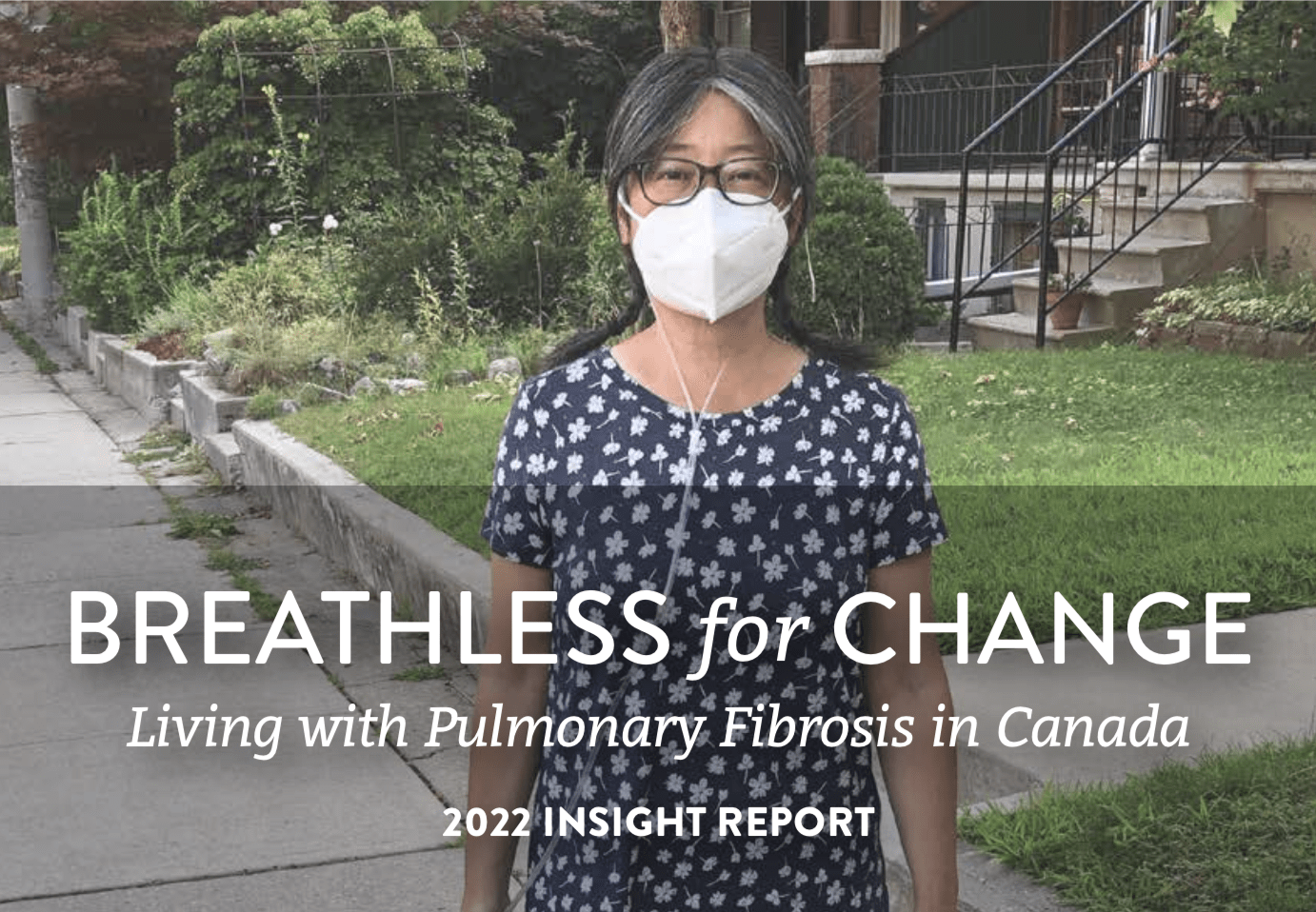National caregivers support group now underway

CPFF’s new, national caregivers support group is a great way to discover ways to take care of yourself and your loved one living with pulmonary fibrosis. It recognizes that PF is a “we” disease, not a “me” disease.
“In our surveys we’ve learned that caregivers have their own challenges and can benefit from sharing thoughts and ideas with others in the same situation,” says Sharon Lee, CPFF Executive Director. “We’ve responded to this gap with this new support group just for caregivers and their unique needs.”
Here’s what a couple of participants have said after the first few meetings:
“Being a part of this support group shows how important it is for our loved ones to have someone to advocate for them….and gives us an outlet to share our concerns.”
“I did not know that there was this wealth of information available on the CPFF website. I will be definitely be taking a walk thru (sic) the library. I do not feel so alone after this meeting. Thank you.”
The one-hour sessions are held via Zoom, every second Monday evening at 7 p.m. EST. The next caregivers support group session will be held on December 12. To register, visit the events calendar and click on the next caregivers meeting. Please note, you need to register for each session.
So far, the group has held three sessions and participants hail from Nova Scotia to BC and places in between. Some are caregivers to loved ones who have lived with PF for more than 11 years and others are just learning about the disease with a newly diagnosed partner.
The sessions are led by CPFF facilitators and cover a range of topics from managing oxygen and planning for the future, to self-care and mental wellness. This support group enables you to share ideas, experiences and feelings in a supportive environment. It may be just what you need to get fresh ideas and keep your spirits up as we head into winter.
21 days of gratitude

Despite the challenges of living with pulmonary fibrosis, or having a loved one with the disease, we all still have so much to be grateful for. Each day, from December 1 to December 21, we’ll be asking you to pause and reflect upon the blessings in your life during our 21 days of gratitude challenge.
As we head into the darkest days of the year, we want to help you and your supporters focus on the lights in your life. It could be a phone call from a special friend. A gesture of support from a family member. A cuddle with your pet. A childhood memory. The changing of the seasons. Clean sheets. A special meal. We all have blessings in our lives that are worth noting in a conscious way.

During the gratitude challenge, we’ll prompt you with a daily question about what you are grateful for, through the CPFF app and on social media. We encourage you to keep a journal of your blessings, and to share some of your favourites on the CPFF app to inspire others. You can browse the app from your computer or download it from Apple app store or the Google Play store. And be sure to follow us on Facebook, Instagram and Twitter.
Send a specially designed gratitude e-card, including some with holiday motifs, to those who make your life better when you make a donation to CPFF during the 21 days of gratitude challenge.
Living beyond your diagnosis: PF and your mental health
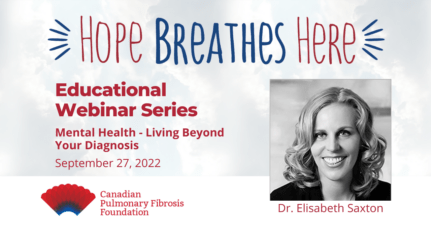
If you want to move beyond the doldrums and find a way back to your true self, you must watch this uplifting and inspiring video featuring Dr. Elisabeth Saxton, a registered psychologist and the National Director of Mental Health Services, CBI Health Group. Entitled “Mental Health: Living Beyond your Diagnosis,” her presentation will help you move towards your values in a purposeful way.
At the outset, Dr. Saxton sets the tone by telling you what you will not hear in her session. Things like: “I know what you are going through,” “Don’t focus on it,” “Others have it worse than you,” “Just think positive,” and “I can make it all better.” And she is good on her word.
She acknowledges that managing a chronic illness takes a lot of energy and resources. She recognizes that living with pulmonary fibrosis (PF) is associated with anxiety and depression, grief and loss, frustration and feeling misunderstood. And then shares ways that you can deal with these thoughts and feelings.
Acceptance and commitment therapy (ACT) is a psychological intervention that uses acceptance and mindfulness strategies, together with commitment and behaviour change strategies, to increase psychological flexibility. ACT emphasizes connecting with thoughts, feelings and sensations which have been avoided and taking control of making choices towards a life based on your values. The goal is to have a psychological shift rather than just focusing on symptom reduction.
“It’s about changing how you interact with your condition and how it impacts your life,” says Saxton. And she knows this first hand. As a survivor of tongue cancer, she had to come to grips with a painful recovery process as a person who made her living speaking in public and to individuals. She did not focus on this fact, and only mentions it near the end of her talk, since each person’s journey and situation is uniquely their own.
Early in her presentation, she leads you through a short mindfulness exercise, just to show you that it requires no special skills, equipment or talent, and can been done in just a short time. “It’s about paying attention, to the present moment, on purpose, without judgement,” she says.
She tells her audience to be kind to themselves. “Stop “should-ing” all over yourself; worrying about what you or others think you should be doing.” she says. “You are not your disease or your symptoms. You have a condition, but you are so much more. Think about all the other things you are. About how people would describe you, your character.”
She asks you to place yourself along a continuum, with values at one end and suffering at the other end. Find where you are the spectrum, and make choices to move towards your values. They are the intangible parts of you that will never go away, such as compassion, parenting, integrity or success. As you make choices and take control, you will feel less overwhelmed. “And while you cannot avoid pain, you can avoid joy,” she quotes.
Take action, to take control. Begin small to move towards your values. Maybe start by watching Dr. Saxton’s video. It will make a difference.
Host a holiday event for a good cause
DIY FUNDRAISE YOUR WAY
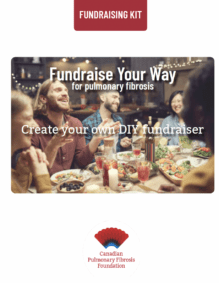
After three long years, many of us, along with our friends, relatives and colleagues, will once again be gathering for holiday celebrations. Consider turning your holiday event into a fundraiser. It’s as easy as 1-2-3 with CPFF’s DIY event fundraising kit. Check out these three ways to fundraise your way.

Pledge a day: Turn your birthday, anniversary or holiday into a fundraiser. It’s simple to create your pledge a day page and make it easy for others to make a donation for pulmonary fibrosis.

Host an event: Do you have a particular skill you can share? Host a virtual yoga night or book club meeting, or raffle off home baked holiday goodies to raise funds. Simply ask your guests to RSVP and they can donate on the RSVP page.

Pay tribute: Is there someone living with pulmonary fibrosis (PF) that you’d like to pay tribute to? Simply create a memorial or tribute page and share with friends, family and colleagues to request donations for PF.
Two new webinars on mast cells, nutrition and PF
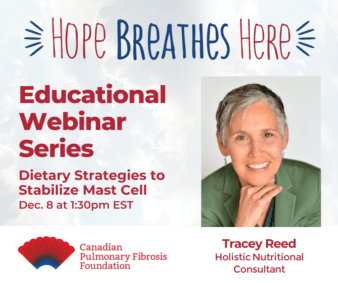
Mark your calendar now for nutritional consultant Tracey Reed’s upcoming webinars on December 8, 2022 and January 12, 2023, each beginning at 1:30 p.m. (EST). Reed will present the next two parts of her three-part series that looks at the role of mast cells in the development of PF and steps you can take to change what is happening with your mast cells. Visit the CPFF online events page to participate in either or both sessions.
If you cannot make these dates and times, the presentations will be posted on the CPFF video library on the website a few days after they are broadcast live.
On December 8, Reed will present “Dietary Strategies to Stabilize Mast Cells.” This session looks at some dietary strategies to help reduce the mast cell component of pulmonary fibrosis. These science-based strategies include:
- Food preparation tips to get started
- Nutrients to add to your diet and the foods that contain them
- Practical tips including budgeting, a meal template, and a recipe.
More details about the third part in the series, coming January 12, will be available closer to the date on the CPFF website’s events page.
You may also want to view Reed’s previous presentations “Anti-inflammatory diet for pulmonary fibrosis” and the first part of the current series on mast cells, nutrition and PF.
Everything you wanted to know about clinical trials and should ask
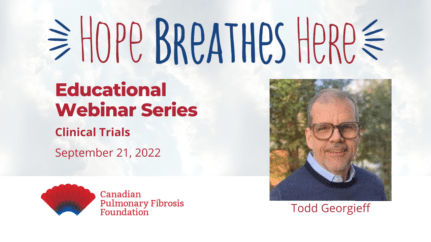
In a straightforward and engaging manner, expert Todd Georgieff delivered his webinar Clinical trials: An Overview (for everyone) and answered participants questions during one of the CPFF’s educational sessions offered during Pulmonary Fibrosis Awareness Month in September.
Todd is uniquely qualified to discuss clinical trials, having been involved in drug development and managing clinical trials for over 30 years. And lately, Todd has been working in areas related to innovation in how trials are done, including decentralized trials and the use of digital technologies. He is also a member of CPFF’s Board of Directors.
He covered a broad range of information about clinical trials, including what they are, why they are done, what you should expect and how to participate. The following are some of the highlights of his talk.
What is a clinical trial?
Clinical trials are conducted to find out whether a treatment, or device, is safe and effective. Studies may also be conducted to understand how medical approaches work for different people. The people who take part in trials are volunteers, and may be people with a condition, or healthy people participating to understand drug effects and safety. Clinical trials must follow strict standards to make sure study participants are safe and that the data is conclusive and the results are reliable.
Why do we need clinical trials?
Clinical trials help us determine, in a systematic, controlled way, the benefits and the side effects of a new treatment. As much as possible, we want to know if changes we observe are the result of the treatment, and not something else. The desired effects need to outweigh any side effects for a new treatment to be approved.
How are clinical trials conducted?
Clinical trials are categorized into phases, and a new treatment will only continue to the next phase when the previous phase is successful. In phase one, a new treatment is often given to a small group of healthy volunteers to evaluate safety and identify side effects. In phase two, a larger group of people with the disease will receive the treatment to see if it has the desired effect. In phase three trials, a much larger group of patients receive the treatment to confirm its effectiveness and safety. Phase four clinical trials are sometimes conducted after the treatment has been approved for use, to gather more information on longer-term effects on much larger numbers of people with the disease. A pulmonary fibrosis patient would most likely be involved in phase two or phase three clinical trials.
The “gold standard” for clinical trials are randomized controlled trials (RCT), where no one can influence, who receives the treatment in the trial and who does not receive it. And “blinding” or “masking” clinical trials ensures Investigators and patients aren’t biased by their views about the treatment(s) they are assigned to receive.
What about patient safety and privacy?
Clinical trials must have government or health authority, as well as ethics committee approval. Trials are strictly regulated and follow standards of clinical practice. They are continually monitored and ethics committees review all information and the study itself. As with all your medical information, your privacy and personal information must be secured as all times.
How do I find a clinical trial?
First check with your PF specialist. They may know about trials recruiting for patients and whether you would be a good fit. The following are online resources you may want to check out.
- In Canada, check the CPFF website.
- For US trials, visit www.pulmonaryfibrosis.org.
- For global trials, visit www.clinicaltrials.gov.
Before you participate…
- Talk to your health care provider and/or respiratory specialist. They will help you determine the risks and benefits for you and whether you are an appropriate candidate for the trial.
- Discuss the commitments, risks and benefits with family members.
- Ask questions during your informed consent interview.
- Consider the time commitment and other requirements involved.
- Remember, you are a volunteer. Even with your signed consent, you can leave a clinical trial at anytime.
Future trends in clinical trials
Patient-focused trials: Focusing on measuring aspects of the disease or the treatment that make the biggest difference for patients rather than more “scientific” measures of the disease.
“Decentralized” or “hybrid” clinical trials: Moving as many activities for the study (e.g., physical exams and other tests, blood sampling, drug administration) to the patient’s location, rather than requiring study participants to come to the clinic for all study activities.
Diversity and Inclusion: Making sure that the participants in the clinical trials have the same make up (gender, race, age, demographics) as the people who will eventually receive the treatment, when it becomes generally available.
If you are interested in learning more about clinical trials, be sure to watch Todd Georgieff’s webinar Clinical Trials: An Overview (for everyone).
Congratulations to our September leaders!
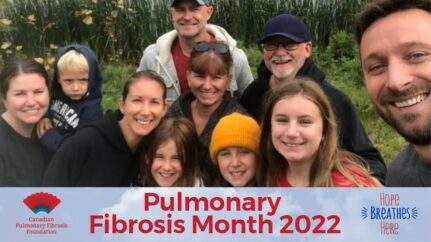
We are all winners following an outstanding 2022 Pulmonary Fibrosis Awareness Month that saw us surpass our fundraising goal, significantly increase our community engagement, grow our social media followers and build awareness with new audiences that had not previously engaged with CPFF.
In total, we experienced more than 54 million interactions with our Awareness Month content through our website, our social media outlets and media coverage in print, radio, TV, websites and social media.
Everyone who participated this year, in any way, deserves a round of applause. However, there are a few fundraising leaders, who deserve extra accolades. Our top three individual fundraisers are: Kirk Morrison ($2,900), Joan Martin ($1,485) and Michelle Brotherton ($625). The top three team fundraisers are: John Dennis’ I Ride for You & Me ($28,958), Khan Krew ($11,700) and Fish Smith Family Run ($5,828).
Once again, congratulations and thank you to everyone who organized and took part in various events. To revisit some memorable moments from this year’s Awareness Month, watch our CPFF 2022 Pulmonary Fibrosis Month Highlight Reel video with detailed results and plenty of participant photos.
CPFF Board welcomes new members
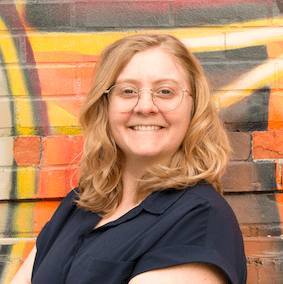
CPFF Board Chair Kirk Morrison is pleased to announce the appointment of two, new Board members: Nicole Hilliard of Ottawa, Ontario and Derek Mastin of Toronto, Ontario. Both bring a legal background, as well as addition skills, to the Board.
Nicole is an employment law lawyer working at a large multi-national firm in Ottawa, Ontario. She has developed industry expertise in evaluating and responding to a broad range of issues that arise during employment relationships.
Nicole also advises on organizational risk management and legislative compliance. She is a member in good standing of the Law Society of Ontario. She was diagnosed with interstitial lung disease (IPF) in 2019.
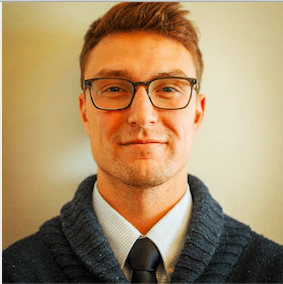
Derek is a final year law student and a member of the Nigigoonsiminikaaning First Nation. He is currently a member of the Board of Directors of Aboriginal Legal Services, involved in corporate governance, fundraising and community engagement.
He has worked with Morrow Sodali (LLC) of Sydney, Australia and as a community engagement consultant with the Little Otter Economic Development Corp. in Canada.
“I was shocked to learn how the dangers of pulmonary fibrosis are generally unknown. This has motivated me to use my background skills engaging institutions to raise awareness about CPFF and expand our services to those in need,” he says.
Read more about these new Board members and the other members of the CPFF Board of Directors, who are all volunteers.
Patient and caregiver survey results now online
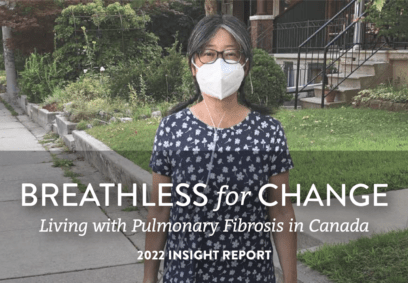
The Breathless for Change, Living with Pulmonary Fibrosis in Canada, 2022 Insight Report is now available on the CPFF website. We shared the highlights of the survey with you in the September issue of this newsletter. Our thanks again to the more than 640 people living with PF and the caregivers who completed the survey.
In the coming months, CPFF will be using the results of this survey, along with feedback from respirologists and oxygen providers, and a research paper on the current provincial health policies on oxygen therapy to advocate for people with PF to have access to the oxygen therapy they need, when they need it, regardless of where they live in the country.
We will also be using your feedback to improve and expand our services to you and your families and to increase awareness of PF.
In memory of Peter Kleinstiver
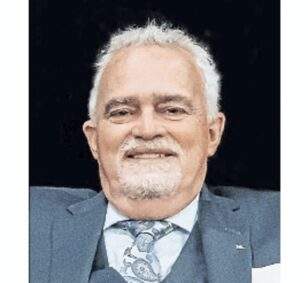
It is with great sadness that we announce the passing of Peter Kleinstiver, 68, of London, Ontario, who passed away Wednesday, November 23, 2022.
Peter recently joined the CPFF Board in August 2022. Unfortunately, for most of that time Peter has been in the hospital. He was able to return home to spend his final days with family. Peter had a lung transplant last year.
Peter held a PhD in Pharmacy and toxicology and throughout his career strived to make a difference in patients’ lives through innovation in the medical field. During his short time as a board member, Peter’s compassion and knowledge made a lasting impression. He will be deeply missed.
CPFF extends its heartfelt condolences to his friends and family. You can read more about Peter here and send personal condolences to his family. In lieu of flowers, the Kleinstiver family is requesting donations to CPFF in memory of Peter.
Children’s book about two grandfathers with pulmonary fibrosis

Magic Gifts, written by Marlene Bryenton and illustrated by Allison Wolvers, is about two grandfathers who take a journey they never dreamed about. Family and friends surround them throughout their journey. Magic gifts help them along the way. Enjoy your journey through life. Do good things along the way!
The book is inspired by two men living with pulmonary fibrosis that the author knows: John Dennis and John Robinson.
You can purchase the book directly from Marlene Bryenton’s website.



